#lilith the evil
Text



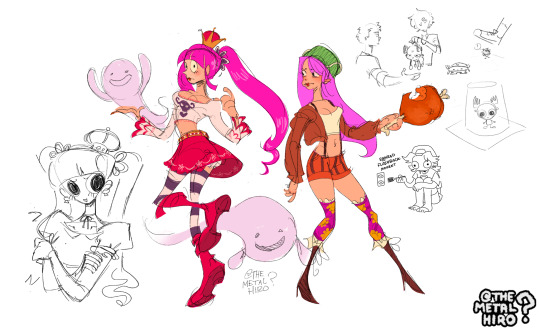
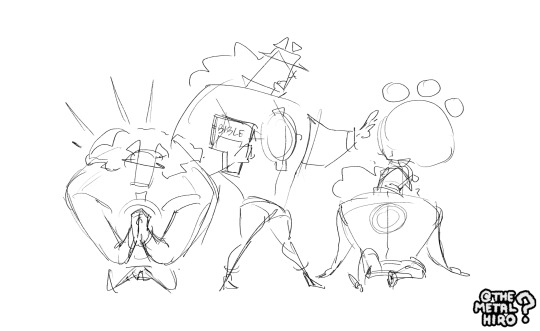




Mixed bag, some re uploaded, some new.
#oh gosh i have to tag everyone now#metalhiro arts#one piece#one piece fanart#corazon#donquixote rosinante#op tom#sanji#chopper#tony tony chopper#cyborg franky#buggy the clown#perona#jewerly bonney#bartholomew kuma#cat burglar nami#wyper#curly dadan#dadan#lilith the evil#jinbe#jinbei#usopp#conis#ms golden week#ms all sunday#sir crocodile#nojiko#toko#kozuki hiyori
5K notes
·
View notes
Text

No Sanji down!
24 notes
·
View notes
Text
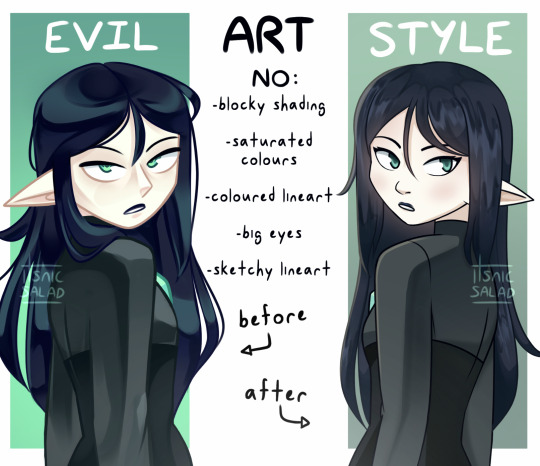
evil art style^^ its been about a year since ive done something like this lol
#the owl house#toh#fanart#the owl house fanart#lilith clawthorne#art challenge#actually i kinda like that evil art style lol
657 notes
·
View notes
Text

Nightmare blunt rotation after the worst wizard convention of their lives

Thi is the original context btw, just a fun twt challenge idk the moment I saw it I knew I had to do this with them
I have big weaknesses for autistic old wizard ladies
#art#digital art#adventure time#fionna and cake#star vs evil#svtfoe#the owl house#betty grof#eclipsa butterfly#lilith clawthorne
602 notes
·
View notes
Text

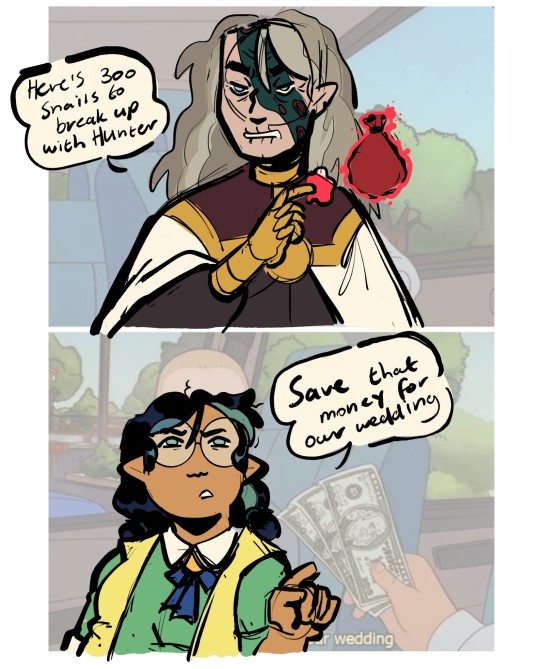
[ID: two owl house drawings based on memes. The first one shows Lilith in her season 2B design sketched over the big bang theory "love is in the air? Wrong! Gad leak" meme. She's staring at the viewer with one eyebrow raised and her glasses are opaque.
The second meme is a redraw of a king of the hill scene, split into two panels. The first panel shows Belos holding up a sack of coins with magic, saying "here's 300 snails to break up with hunter". The second panel shows willow in her s2B design pointing at him and saying "save that money for our wedding". End ID]
I did two things today, and that was really beef it while making a sandwich, and draw shitty owl house memes, and baby I'm all out of sandwiches to post (@toh-described)
#the owl house#toh#lilith clawthorne#willow park#toh belos#toh meme#huntlow#aroace lilith#give me more memes to redraw toh characters as this is the most art I've gotten done in weeks LMAO#the second drawing is very specifically inspired by a doodle i did in school of willow and belos where i labeled them as in-laws#and while it's so so far from canon (belos is just some evil shadowy figure to willow and she doesn't exist to him-#-as anything other than an unnotable companion to Luz/hunter or. yknow. depending on how s3 pans out 👀 wittewife parallel)#but them being bitchy in-laws is so funny to me you guys. it's so fucking funny#and somebody's definitely done love is in the air gas leak w/ Lilith before but i couldn't not do my own#I've been wanting to draw her all week she's just one of the ones i really enjoy drawing#she's got big round glasses and poofy hair and a long face and goth girl lips how can i not love drawing her. AND she's hot as fuck#like hello?#anyway yeah aroace Lilith and willow vs belos content be upon ye
5K notes
·
View notes
Text
I would also love to add something about Lilith in regards to my theory about Roo owning Alastor (linked here).

We all know that Lilith and Alastor disappeared for the same period of time. We also know that Alastor sold his soul to an unbeknownst demon…and my other post is Eve/Roo holds Alastor captive but where does Lilith come in, you ask?
It has been stated already that Lilith hates being subservient to Adam and is said to be rebellious of whatever authority comes into her. With that being said I believe Roo took interest in both for their powers.

She is a “looming threat in the distance” and I have said something in the comments about when a character is disregarded or left in the dark for QUITE SOME TIME, usually they’d be a plot bomb. Just waiting for the perfect time to drop them and for people to go like “OHHH HOW COME I NEVER THOUGHT OF THAT!!” or “WHAT. I COMPLETELY FORGOT ABT THEM.”
She’s a landmine waiting to be triggered.
And with Alastor manifesting such raw power despite being a mortal soul, and Lilith being the ruler of hell. Roo absolutely loves chaos and evil and she saw potential in both characters.
MY THEORY is that Roo captured Lilith and Alastor, wanting them both to sell their souls to her but well of course! Lilith rejects Roo because that’s her personality; she LOATHES submission. She refuses to kneel for anyone.
And in order for her to escape Roo’s never ending pestering she makes a desperate deal with Adam, and that is for her to reside in heaven while in return Adam can exterminate her people. I feel like there’s a condition to it because why would Lilith care so much about not submitting that she would risk her people’s OR her own daughter’s life. Surely there’s a catch.
What do you think is the catch?🥲🤔
#hazbin hotel#alastor#radio demon#lucifer morningstar#charlie morningstar#hazbin hotel lilith#lilith morningstar#hazbin hotel roo#eve hazbin hotel#root of all evil#theory#episode 8#spoilers#spoiler alert#vaggie#niffty#hazbin hotel husk#angel dust
317 notes
·
View notes
Text
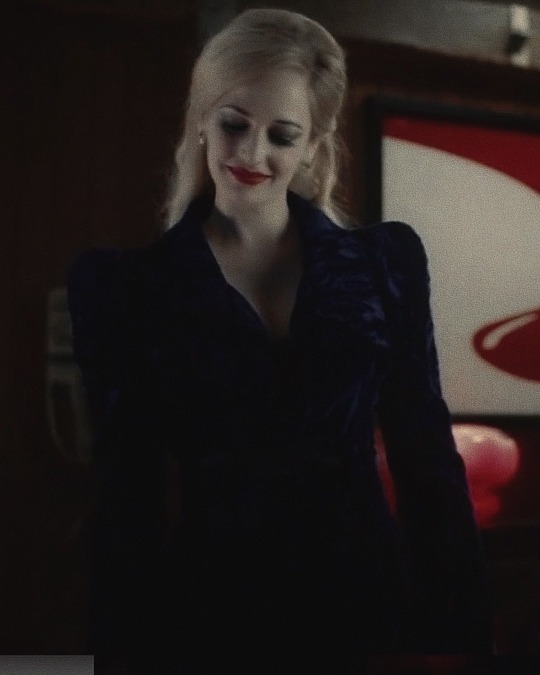

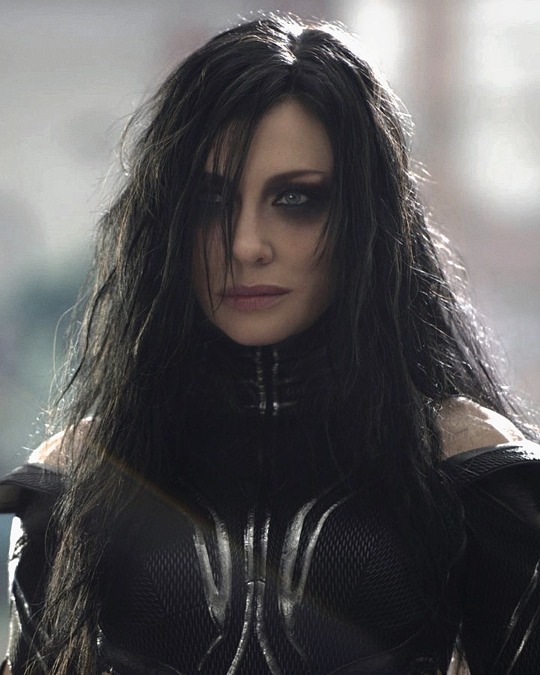



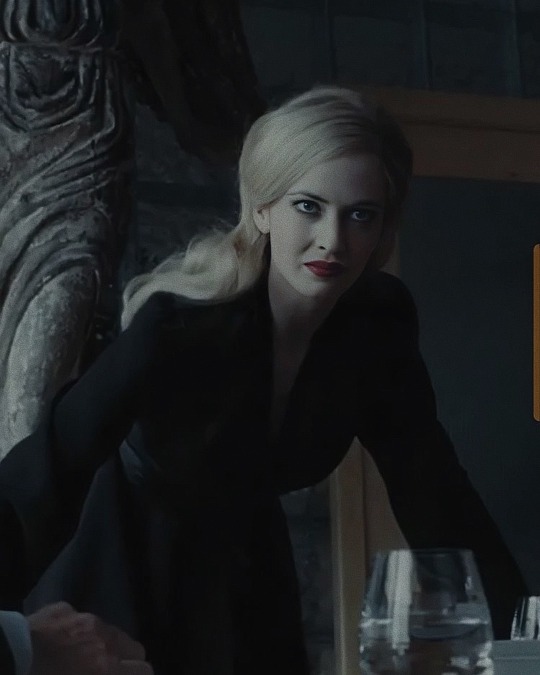

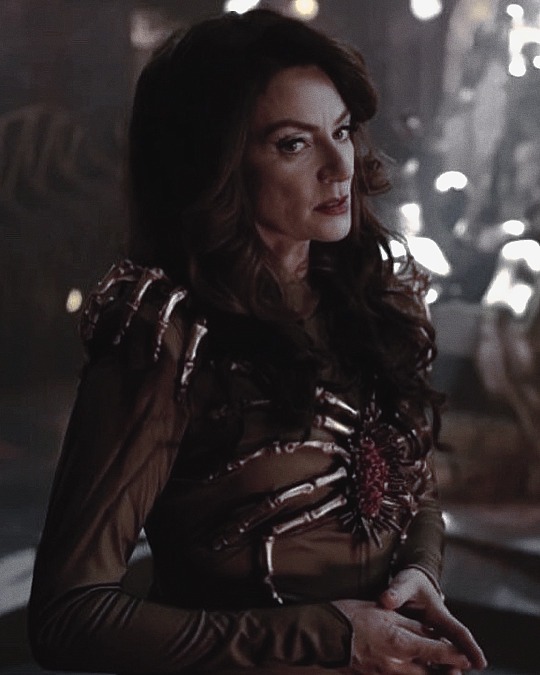
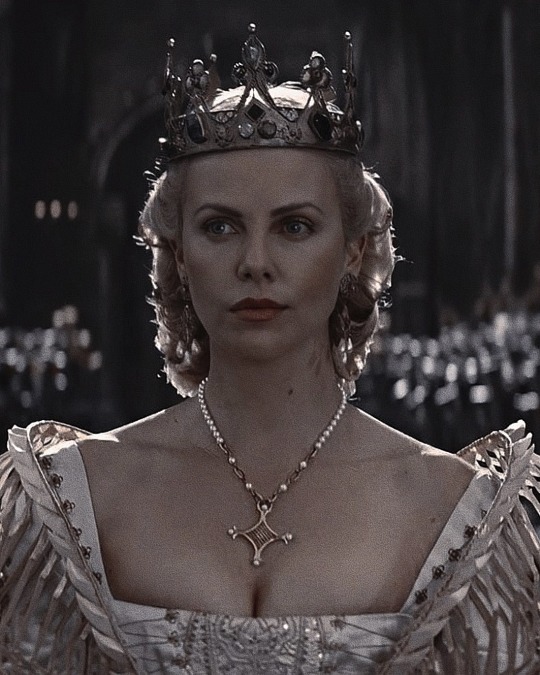
category is : the kind of woman that will actually just kill me |・ω・) 🫶🏻
#i’ll happily let them eat me#no pun intended#if evil why hot#if evil why sexy#evil >>>>>>>>>>>>>#i don’t think you understand but at the same time i do#queen ravenna#angelique bouchard#lady dimitrescu#sandman lucifer#lilith ritter#lilith#madame satan#hela odinsdottir#charlize theron#eva green#gwendoline christie#cate blanchett#michelle gomez
2K notes
·
View notes
Text
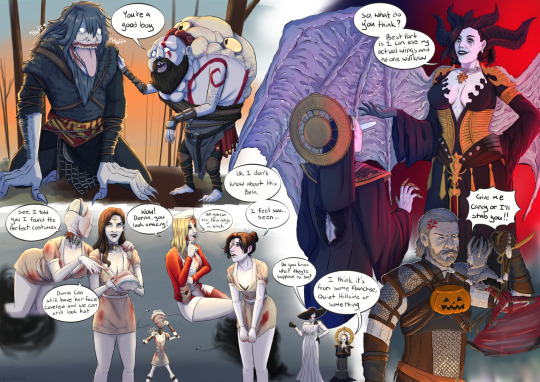
Resident evil village meets other video game franchises 😛
#re8 fanart#resident evil fanart#resident evil 8#re village#resident evil#re8 village#fanart#lady dimitrescu#mother miranda#karl hesienberg#salvatore moreau#donna beneviento#angie beneviento#bela dimitrescu#cassandra dimitrescu#daniela dimitrescu#diablo lilith#god of war#witcher#silent hill nurse#re8#re8 art#re8 lords#re8 meme#resident evil 8 fanart#resident evil fandom#resident evil village#resident evil art#artists on tumblr#resident evil memes
576 notes
·
View notes
Text
Paradise Lost: How John Milton's 1667 work influenced "Hazbin Hotel"
I've been thinking about why the "fruit of knowledge" in Hazbin Hotel is depicted as an apple, as opposed to another fruit that would've been more accurate to the Middle East during the Fall of Man, as well as how Paradise Lost by John Milton (1667) influenced the show.
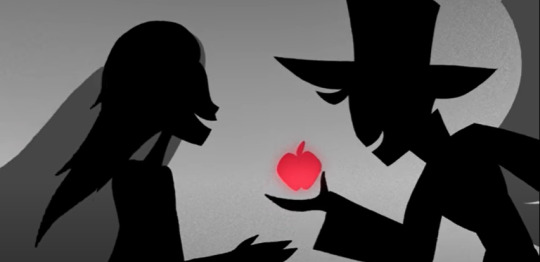
Per one source:
"Because the Hebrew Bible describes the forbidden fruit only as 'peri', the term for general fruit, no one knows [what exactly type of fruit it was]. It could be a fruit that doesn't exist anymore. Historians have speculated it may have been any one of these fruits: pomegranate, mango, fig, grapes, etrog or citron, carob, pear, quince, or mushroom."
Per Wikipedia:
"The pseudepigraphic Book of Enoch describes the tree of knowledge: 'It was like a species of the Tamarind tree, bearing fruit which resembled grapes extremely fine; and its fragrance extended to a considerable distance. I exclaimed, How beautiful is this tree, and how delightful is its appearance!' (1 Enoch 31:4)."
In Jewish and Islamic traditions, the "fruit of knowledge" is commonly identified with grapes. The Zohar explains that Noah attempted (but failed) to rectify the sin of Adam by using grape wine for holy purposes. Today, the "Noah grape" is still used to make white wine.

Furthermore:
"The association of the pomegranate with knowledge of the underworld as provided in the Ancient Greek legend of Hades and Persephone may also have given rise to an association with knowledge of the 'otherworld', tying-in with knowledge that is forbidden to mortals. It is also believed Hades offered Persephone a pomegranate to force her to stay with him in the underworld for 6 months of the year. Hades is the Greek god of the underworld, and the Bible states that whoever eats the forbidden fruit shall die."
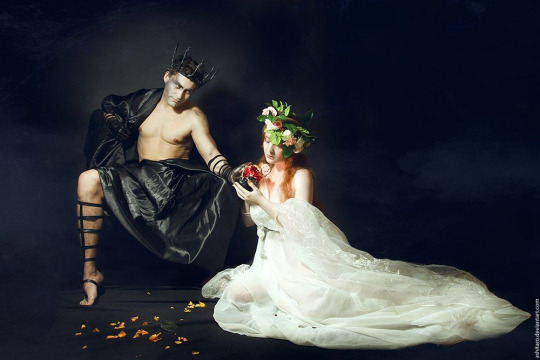
So, how then did the apple become the foremost symbol of the "fruit of knowledge"? You can partly thank Paradise Lost by English poet John Milton, a work which the lore of Hazbin Hotel is based off of.
Milton published the book in 1667, a time when the hedonistic Restoration era was in full swing. The exiled King Charles II was restored to the throne as King of England in 1660, and was a party animal, with dozens of mistresses, and nicknamed both the "playboy prince" and "Old Rowley", the latter after his favorite lustful stallion.
However, the association of the "fruit of knowledge" began with a Latin pun long before Milton immortalized the association in Paradise Lost. Per the linked article above by Nina Martyris for NPR:
"In order to explain, we have to go all the way back to the fourth century A.D., when Pope Damasus ordered his leading scholar of scripture, Jerome, to translate the Hebrew Bible into Latin. Jerome's path-breaking, 15-year project, which resulted in the canonical 'Vulgate', used the Latin spoken by the common man. As it turned out, the Latin words for evil and apple are the same: 'malus'.
[...] When Jerome was translating the 'Tree of the Knowledge of Good and Evil', the word 'malus' snaked in. A brilliant but controversial theologian, Jerome was known for his hot temper, but he obviously also had a rather cool sense of humor.
'Jerome had several options,' says Robert Appelbaum, a professor of English literature at Sweden's Uppsala University. 'But he hit upon the idea of translating 'peri' as 'malus', which in Latin has two very different meanings. As an adjective, 'malus' means 'bad' or 'evil'. As a noun it seems to mean an apple, in our own sense of the word, coming from the very common tree now known officially as the 'Malus pumila'. So Jerome came up with a very good pun.'
The story doesn't end there. 'To complicate things even more,' says Appelbaum, 'the word 'malus' in Jerome's time, and for a long time after, could refer to any fleshy seed-bearing fruit. A pear was a kind of 'malus'. So was the fig, the peach, and so forth.'
Which explains why Michelangelo's Sistine Chapel fresco features a serpent coiled around a fig tree. But the apple began to dominate Fall artworks in Europe after the German artist Albrecht Dürer's famous 1504 engraving depicted the First Couple counterpoised beside an apple tree. It became a template for future artists such as Lucas Cranach the Elder, whose luminous Adam and Eve painting is hung with apples that glow like rubies.
Milton, then, was only following cultural tradition. But he was a renowned Cambridge intellectual fluent in Latin, Greek and Hebrew, who served as secretary for foreign tongues to Oliver Cromwell during the Commonwealth. If anyone was aware of the 'malus' pun, it would be him, and yet he chose to run it with it. Why?
Appelbaum says that Milton's use of the term 'apple' was ambiguous. 'Even in Milton's time the word had two meanings: either what was our common apple, or, again, any fleshy seed-bearing fruit. Milton probably had in mind an ambiguously named object with a variety of connotations as well as denotations, most but not all of them associating the idea of the apple with a kind of innocence, though also with a kind of intoxication, since hard apple cider was a common English drink.'
It was only later readers of Milton, says Appelbaum, who thought of 'apple' as 'apple', and not any seed-bearing fruit. For them, the forbidden fruit became synonymous with the 'malus pumila'. As a widely read canonical work, 'Paradise Lost' was influential in cementing the role of apple in the Fall of Man story."
To tie this back into John Milton's relationship with King Charles II of England, as mentioned, Milton originally served Oliver Cromwell, Lord Protector of England, and the English Commonwealth, which was formed with the overthrow and execution of King Charles I on 30 January 1649, following the bloody English Civil War (1642 – 1651).
The King's two sons - the newly-christened King Charles II, the elder, and James, Duke of York (King James II), the younger - fled into exile on the European continent. However, with the death of Oliver Cromwell on 3 September 1658 came the 2-year-long dissolution of the English Commonwealth, and the restoration of the monarchy.
As for Milton himself, we can look to an article by Bill Potter.
Milton, born on 9 December 1608, was around 51-52 years old when King Charles II was restored to the throne. He attended Christ's Church, Cambridge in his youth, and mastered at least six languages, as well as history and philosophy; making him, perhaps, the most knowledgeable poet in history. He spent more than a year travelling across Europe, conversing with and learning from intellectuals, linguists, poets, and artists, including the famous Galileo Galilei.
However, Milton was a controversial figure of his time, being unafraid to criticize institutions of authority; arguing that "divorce was Biblical", for which he was routinely condemned; joining the Puritans; penning the Areopagitica, a treatise on liberty in favor of Parliament and the Roundhead rebels, during the reign of King Charles I, arguing that the King must be held accountable by the people; and agreed with and justified the murder of King Charles I, for which Parliament hired him in 1649 as a propagandist and correspondence secretary to foreign powers, on account of his fiery manifestos against "the man".
The collapse of the Commonwealth with the death of Oliver Cromwell in 1658 did not deter Milton from continued political writing against the monarchy and the new public sentiment that brought about its Restoration under King Charles II in 1660. On the contrary, Milton - now totally blind, having lost his eyesight by the age of 44 in 1652, a decade earlier - began writing Paradise Lost in 1661, and spent the next six years dictating the work to transcribers.
A supporter of regicide, Milton was also forced into exile himself, and faked his own death, as Charles refused to pardon - and sought to execute - any of those directly involved with his father's murder. Milton's friends held a mock funeral for Milton on 27 August 1660, just months after the coronation of King Charles II on 23 April 1660.
King Charles II commented that he "applauded his [Milton's] policy in escaping the punishment of death [execution for treason] by a reasonable show of dying", but insisted on a public spectacle nonetheless by having Milton's writings burned by the public hangman.
After eventually obtaining a general pardon from King Charles II, Milton was imprisoned, and released, likely due to political friends in high places. He died, aged 64, in 1674. His theological views were sometimes considered heterodox by the best Puritans, and his political views came close to getting him executed on several occasions. His poetry, however, has endured as some of the greatest works in the English language, especially Paradise Lost; much of his greatest work was written during his 22 years of complete blindness.
One of the main factors in King Charles II deciding to grant a pardon to Milton was, ironically, Paradise Lost. While originally written by Milton as a scathing criticism of King Charles II and the monarchy - depicting Lucifer Morningstar as a sympathetic rebel against God, with King Charles II claiming that is right to rule came from "divine ordainment" - Charles II enjoyed the work, and authorized its publication on 20 August 1667. We know this because a 1668 copy of Paradise Lost in royal bindings by Samuel Mearne, bound lovingly in a fine red leather made of goat skins tanned with sumac, and stamped in gold with the royal cypher of King Charles II, was found. The endpapers bore a watermark with the royal arms of Charles II.
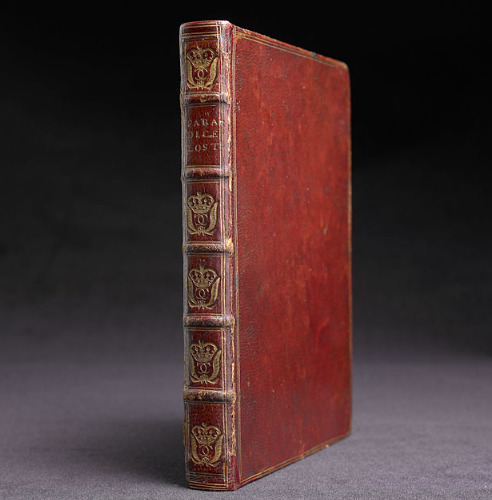
Per one Miltonian scholar: "The most single important event in Milton's life was the event against which he struggled most: the Restoration of Charles II, [and his relationship with the King]. Had it not come, we might have never had Paradise Lost...certainly, we should never have had [it] in [its] present power and significance."
Milton followed up Paradise Lost with Paradise Regained in 1671, three years before his death, with advice for King Charles II, urging the hedonistic Charles to "reign over himself and his passions":
"For therein stands the office of a King, His Honour, Vertue, Merit and chief Praise, That for the Publick all this weight he bears. Yet he who reigns within himself, and rules Passions, Desires, and Fears, is more a King; Which every wise and vertuous man attains: And who attains not, ill aspires to rule Cities of men, or head-strong Multitudes, Subject himself to Anarchy within, Or lawless passions in him which he serves." - John Milton, Paradise Regained, Book II, lines 463-472
To summarize: "If we must have a King back again, my Lord, please try to be a good man, unlike your father, who fell to his pride, [which was also the downfall of Lucifer]."
To quote another source: "Though the passage begins by noting that the office of a King is to bear the weight of public concerns, it is the control of one's private concerns that truly set a King apart as a virtuous character. Indeed, so important is self-command that any wise or virtuous man who attains it is like a king; any king who does not practice [self-command] is nothing more than a mere subject, ruled by anarchy and lawlessness."
Milton's words, too, echo a work written by Charles' grandfather, King James VI/I of Scotland and England: Basilikon Doron ("Royal Gift").
Per Wikipedia:
"'Basilikon Doron' (Βασιλικὸν Δῶρον) means 'royal gift' in Ancient Greek, and was written in the form of a private letter to James' eldest son, Henry, Duke of Rothesay (1594–1612). After Henry's death, James gave it to his second son, Charles, born 1600, later King Charles I. Seven copies were printed in Edinburgh in 1599, and it was republished in London in 1603, when it sold in the thousands.
This document is separated into three books, serving as general guidelines to follow to be an efficient monarch. The first describes a king's duty towards God as a Christian. The second focuses on the roles and responsibilities in office. The third concerns proper behaviour in daily life.
As the first part is concerned with being a good Christian, James instructed his son to love and respect God as well as to fear Him. Furthermore, it is essential to carefully study the Scripture (the Bible) and especially specific books in both the Old and New Testaments. Lastly, he must pray often and always be thankful for what God has given him.
In the second book, James encouraged his son to be a good king, as opposed to a tyrant, by establishing and executing laws as well as governing with justice and equality, such as by boosting the economy. The final portion of the Basilikon Doron focuses on the daily life of a monarch.
All of these guidelines composed an underlying code of conduct to be followed by all monarchs and heads of state to rule and govern efficiently. James assembled these directions as a result of his own experience and upbringing. He, therefore, offered the 'Basilikon Doron' ('Royal Gift') to his son, with the hope of rendering him a capable ruler, and perhaps to pass it down to future generations.
Overall, it repeats the argument for the divine right of kings, as set out in 'The True Law of Free Monarchies', which was also written by James. It warns against 'Papists' (Roman Catholics) and derides Puritans, in keeping with his philosophy of following a 'middle path', which is also reflected in the preface to the 1611 King James Bible. It also advocates removing the Apocrypha from the Bible."
King James VI/I further instructed his son and grandson:
"A good monarch must be well acquainted with his subjects, and so it would be wise to visit each of the kingdoms every three years."
"During war or armed conflict, he should choose old-but-good captains to lead an army of young and agile soldiers."
"In the court and the household, [a royal] should carefully select loyal gentlemen and servants to surround him. When the time came to choose a wife, it would be best if she were of the same religion and had a generous estate. However, she must not meddle with governmental politics, but perform her domestic duties."
"As for inheritance, to ensure stability, the kingdom should be left to the eldest son, not divided among all children."
"Lastly, it is most important...that [a royal] would know well his own craft...to properly govern over his subjects. To do so, [one] must study the laws of the kingdom, and actively participate in the council. Furthermore, [one] must be acquainted with mathematics for military purposes, and world history for foreign policy."
"[A royal] must also not drink and sleep excessively. His wardrobe should always be clean and proper, and he must never let his hair and nails grow long. In his writing and speech, he should use honest and plain language."
King James VI/I further supplemented Basilikon Doron with a written treatise titled The True Law of Free Monarchies: Or, The Reciprocal and Mutual Duty Between a Free King and His Natural Subjects.
"It is believed King James VI/I wrote the tract to set forth his idea of absolutist monarchism in clear contrast to the contractarian views espoused by, among others, James' tutor George Buchanan (in 'De Jure Regni apud Scotos'), [which] held the idea that monarchs rule in accordance of some sort of social contract with their people. James saw the divine right of kings as an extension of the apostolic succession, as both not being subjected by humanly laws."
Milton's own Areopagitica was a follow-up on De Jure Regni apid Scotos by George Buchanan, and also to The True Law of Free Monarchies, as well as the idea of the "divine right of kings". It takes its title in part from Areopagitikos (Greek: Ἀρεοπαγιτικός), a speech written by Athenian orator Isocrates in the 4th century BC.
Most importantly, Milton also wrote on the concept of free will: "Milton's ideas were ahead of his time in the sense that he anticipated the arguments of later advocates of freedom of the press by relating the concept of free will, and choice to individual expression and right."
The concept of free will, too, was a major topic explored in Paradise Lost. Per one source: "In 'Paradise Lost', Milton argues that though God foresaw the Fall of Man, he still didn't influence Adam and Eve's free will. [...] God specifically says that he gives his creatures the option to serve or disobey, as he wants obedience that is freely given [or chosen], not forced. Some critics have claimed that the God of the poem undercuts his own arguments; however, Milton did not believe in the Calvinistic idea of 'predestination' (that God has already decided who is going to Hell and who to Heaven), but he often comes close to describing a Calvinistic God. God purposefully lets Lucifer (Satan) escape Hell, and sneak past Uriel into the Garden of Eden, and basically orchestrates the whole situation so that humanity can be easily ruined by a single disobedient act. In describing the Fall of Man before it happens, God already predicts how he will remedy it, and give greater glory to himself by sending his Son [Jesus Christ] to die, and restore the order of Heaven."
In Hazbin Hotel, Adam also describes the Calvinistic idea of 'predestination', and that "the rules are black and white":

However, "This possible predestination leads to the theory of the 'fortunate fall', which is based on Adam's delight at learning of the eventual coming of the Messiah [from his bloodline]. This idea says that God allowed the Fall of Man, so that he could bring good out of it, possibly more good than would have occurred without the Fall, and be able to show his love and power through the incarnation of his Son. In this way, the free will of Adam and Eve (and Lucifer/Satan) remains basically free, but still fits into God's overarching plan."
However, there is one major flaw with this, and that is that we don't know if Jesus Christ exists within the Hazbin Hotel universe or not. Yet Charlie Morningstar, the daughter of Lucifer Morningstar and Lilith, and the "Princess of Hell", is depicted as a savior-esque figure within the show who, like God in Paradise Lost, encourages lowly sinners to choose obedience to God out of their own free will. More interestingly, Charlie does not come from Adam's bloodline; yet, while Lucifer decries 'free will', Charlie supports 'free will' instead.
Perhaps is is merely because Charlie, being the daughter of Lucifer and Lilith, claims to want to fulfill Lilith's "dream" of humanity being empowered in Hell ("The mind is its own place, it can make Heaven out of Hell, or Hell out of Heaven" - Lucifer, Paradise Lost); however, I think it also stems from Charlie having a genuine belief that 'free will', and people choosing to do good instead of evil, is "good" and "Godly".
True to Paradise Lost, this is also in fulfillment of God's plan; and, according to one fanfiction, why God allowed Charlie to be born to Lucifer and Lilith, so that sinners may be redeemed through Charlie.
For more on differing interpretations of 'free will', I suggest reading: "Free Will and the Diminishing Importance of God's Will: A Study of Paradise Lost and Supernatural" by Kimberly Batchelor (2016)
Excerpt: "'Paradise Lost' –and Milton’s purpose for writing the poem— is rooted deeply in postreformation Arminianism and this is apparent in its employment of free will. Chapter 1 argues that Milton turns to free will as a tool to justify the actions of God. Freedom of choice is God-given, and sets up a morality in which right and wrong are dictated by God. Chapter 2 shows that in 'Supernatural', free will is not given by a higher power; and, in fact, free choice functions as an act of defiance against God's will."
This raises the question: Is 'free will' given by God, using Lucifer as his vessel, in Hazbin Hotel, as in Paradise Lost? Or is 'free will' not given by a higher power; and, in fact, an act of defiance against God?
This brings us back around to our first question: Why is an apple, or 'malus', used to depict the "fruit of knowledge", especially if 'malus' means 'bad or evil', whereas Milton depicts 'free will' as God-given?
Well, for one, Lucifer still chooses to associate himself with apple symbolism and imagery, despite being skeptical of free will:
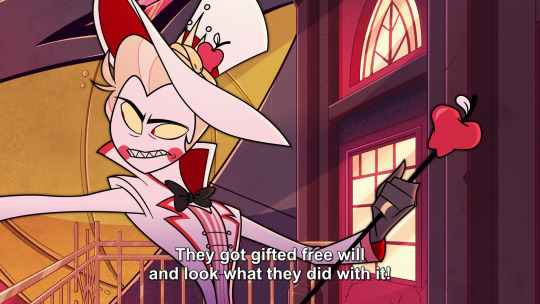
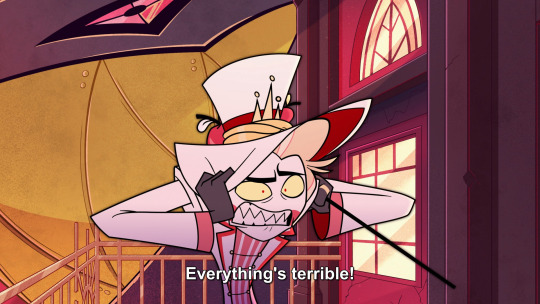
Based on the introduction to Episode 1, Charlie also views 'free will' as a gift (Miltonian), whereas Lucifer appears to view it as a curse.
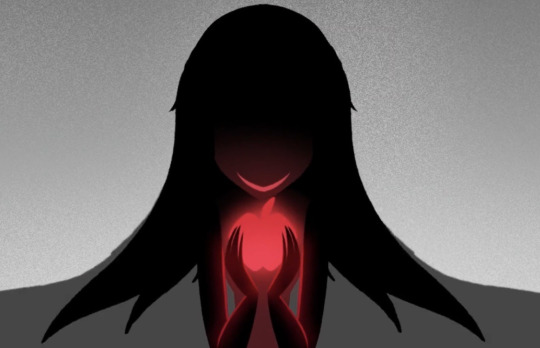
However, Charlie also notes that it was through the 'gift' of free will that the "root of all evil" entered the world, for if mankind could choose to be good, then they could also choose to be evil ('malus').
John Milton states in Paradise Lost: "Of Man's First Disobedience, and the Fruit Of that Forbidden Tree [malus], whose mortal taste Brought Death (evil, malus) into the World, and all our woe."
Thus, the use of an apple specifically is likely a tie-in to what others have been speculating about a character that series creator Vivienne Medrano (Vivziepop) alluded to a while back: "The Root of All Evil".
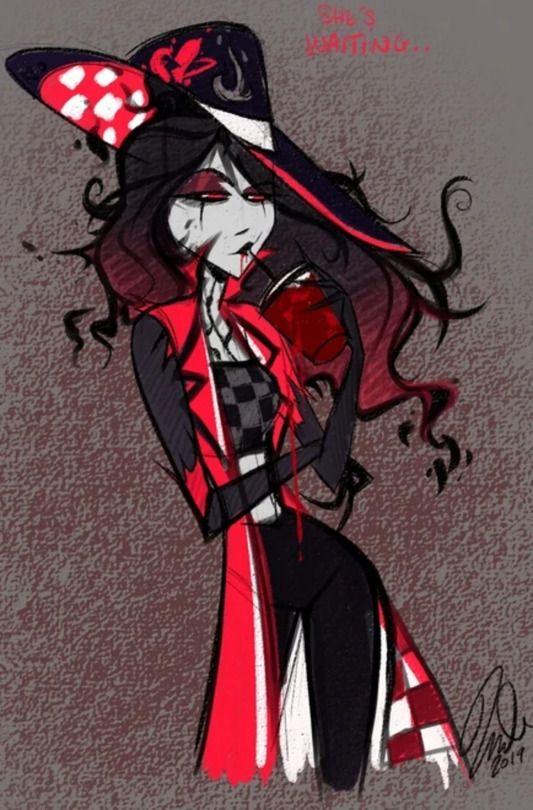
However, "Roo" itself is depicted as possessing the body of a human woman, presumably Eve, the first one to eat the "fruit of knowledge":
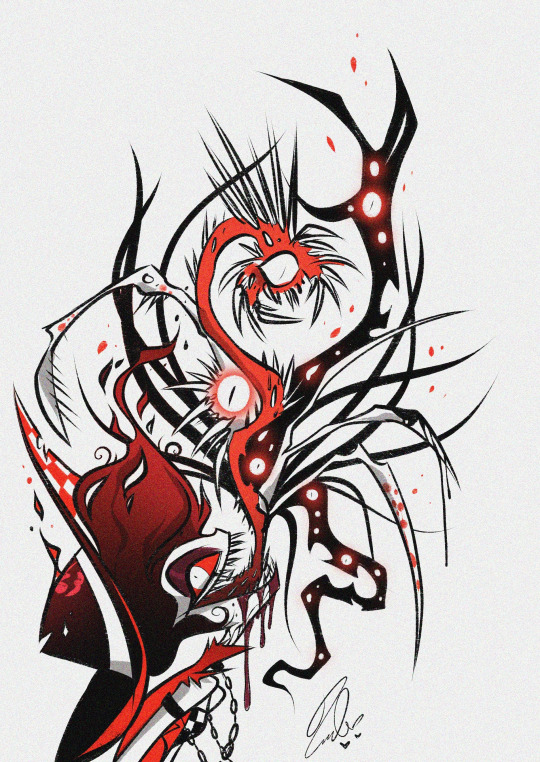
Thus, we can discern that "Malus" likely refers to this character. (Also see: "Maleficent", a name that also uses the root word "mal", "evil".) As for Roo's intentions, if Charlie is "good" - and, if, in fact, Alastor was sent by "Roo" (Eve) - then they may want for Alastor to work on their behalf to "corrupt" Charlie, or make sure the hotel never succeeds.
This is because demonic power is tied to human souls, and there are "millions of souls" in Hell, which likely fuels the great power of "Roo". The more souls there are in Hell, the more powerful "Roo" becomes. The Overlords also get their demonic power from "millions of souls".
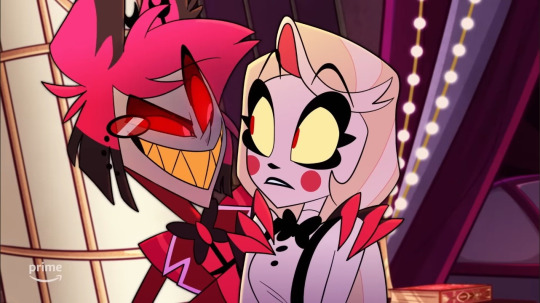
The deal between Eve and "Roo" might even be the first contract, or deal, between a human soul and a demonic entity; in exchange for 'free will', and the knowledge of good and evil, Eve allowed the "Root of All Evil" to inhabit her body, and to escape the void or prison it was confined to by Heaven (Hell?). (For one cannot be 'all-good' unless you attempt to 'eliminate' or 'ablate' evil; and, in Greek mythology, Zeus imprisoned the Titans in Tartarus for all of their evil deeds.)
Another possibility, brought up in an article by Gillian Osborne, is that Lucifer sees the "fruit of knowledge" as an apple, but it may appear as different fruits to different people, depending on how they view it. This also fits with Lucifer and angels being able to easily shapeshift.
In Paradise Lost, only Lucifer describes the fruit as an "apple" (malus), as he associates malus with "bad, evil", while the narrator also describes the fruit as "a mix of different colors" and peach-like. This then begs the question: "Did the fruit of knowledge of good and evil become 'evil' because Eve harbored resentment towards Adam?"
Quote: "Lucifer (Satan) gives Eve yet another hint that this tree may be more complicated than he wishes her to believe: although elsewhere in Milton's poem Eden is heady with its own newness, sprouting spring flowers left and right, the tree of knowledge is already old: its trunk is 'mossie'. Nevertheless, Lucifer claims to wind himself around the tree 'soon'; the quickness of his reported arrival stands in contrast to the timescales required to cover a fruit tree with moss (PL 9.589). Placing Lucifer's winding body between these two timescales—an easeful present and the inhuman scale of natural history—Milton suggests that there is something dangerous in entangling the past with the present. Yet, 'Paradise Lost' also makes deep biblical history feel like present politics for its readers. When Adam and Eve wander out of Eden at the end of the poem, they famously make their way not only into an earthly paradise, but also into the present. Eden's mossy apple tree therefore represents the pitfalls of conflating nature and history, of seeing any action in human history—even Eve's eating of an apple—as natural, if by nature, we mean inevitability. For Milton, history, unlike nature, is directed by humans, progressive, and, like the reading of 'Paradise Lost', hard work. While trees may inevitably collect moss the longer they live, Adam and Eve's labors in the garden, and our labors of reading, require agency and effort. Milton's poem refuses mourning the loss of Eden, [and the perfection of Heaven], in favor of a perpetual, melancholic, recreation of paradise: a present perfecting."
To quote Twisted: The Untold Story of a Royal Vizier, which also draws inspiration from John Milton's Paradise Lost: "It's an unfortunate situation...but you do have a choice [i.e. free will]."
#hazbin hotel#hazbin hotel analysis#hazbin#hazbin analysis#hazbin hotel meta#hazbin meta#hazbin hotel theory#hazbin theory#deep thoughts#john milton#paradise lost#eve hazbin hotel#lucifer hazbin hotel#lucifer morningstar#adam hazbin hotel#lilith hazbin hotel#lilith morningstar#roo hazbin hotel#root of all evil
204 notes
·
View notes
Text

walk with me everyone
#hazbin hotel#hazbin hotel fanart#hazbin hotel lute#lilith hazbin hotel#lilith x lute#evil yuri#lilute#lulith
181 notes
·
View notes
Text
alright the teased sketches are here!

First up, Rosie. I decide to somewhat play with her initial design into the era she was based( Edwardian era) . I included Franklyn because I wanted to draw her , also I want to show the relationship between her and Rosie.
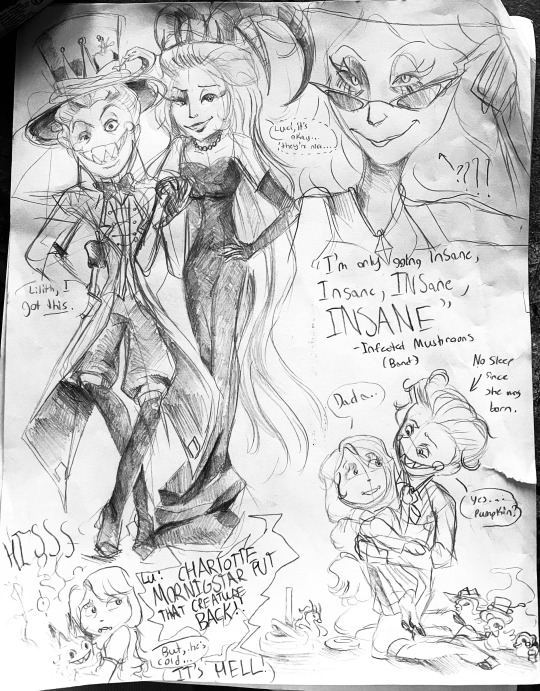
Next we have the Morningstar family, the sketch features a lyric from the song “ Insane” by Infected Mushrooms; which is supposed to represent the ominous figure above the lyrics, ( possibly Roo disguised as Lilith).Then there’s Luci bonding with an infant Charlie despite being stressed. At the bottom left corner is Charlie protecting cursed kitty alastor , who is not welcomed by Lucifer.
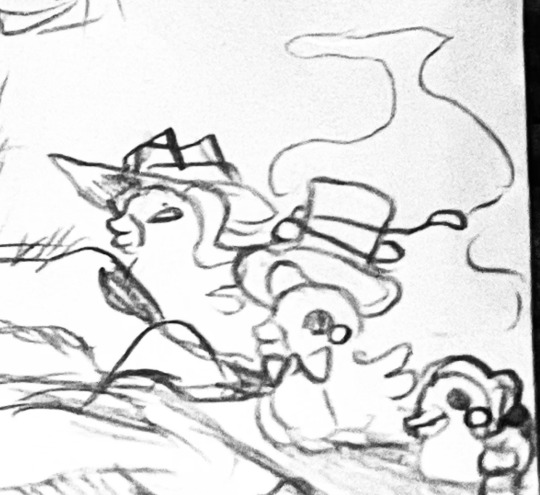

also the rubber ducks of Roo, Lucifer and Charlie on the right, and on the left a swan version of Lilith , in the play room with Charlie and Lucifer.
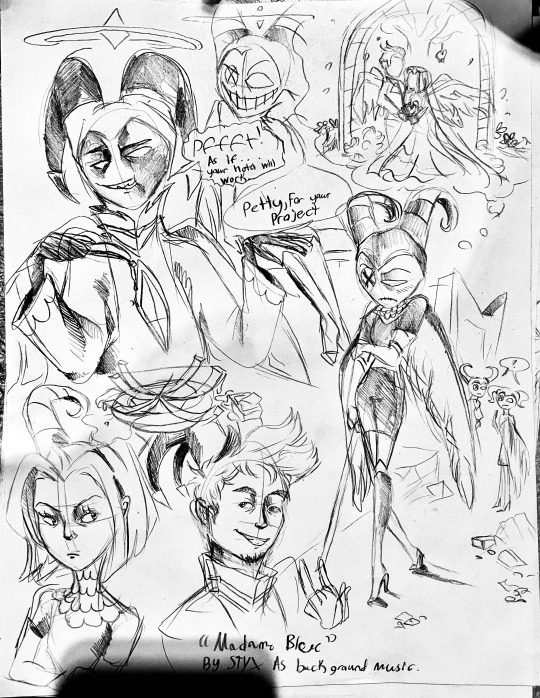
Last but not last fanart of Adam and Lute. On almost every post I had mentioned that I will make fanart of Adam therefore I had commented to my promise because I’m also a fan of the character.
stay tuned
yours truly
artist in process
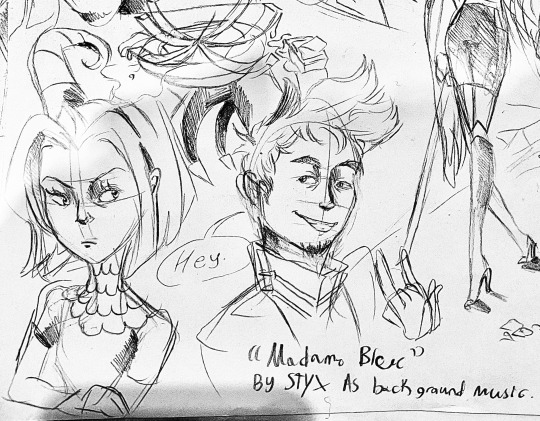
#artist on tumblr#my fanart#hazbin hotel#hazbin art#hazbin hotel fanart#black and white#hazbin lucifer#hazbin lilith#hazbin charlie#hazbin alastor#cursed cat alastor#curse kitty alastor#hazbin rosie#hazbin franklyn#edwardian#hazbin hotel roo#root of all evil#hazbin roo#lucifer magne#lucifer morningstar#charlie Morningstar#charlie magne#Infinite refraction’s art#lucifer x lilith#hazbin hotel adam#hazbin adam#hazbin hotel lute#guitarspear#hazbin lute#adam x lute
105 notes
·
View notes
Text





Tonights random assortment of one piece sketches
#surprised to say dadan is SO fun to draw#metalhiro arts#one piece#op toko#toko#vegapunk#op lilith#lilith the evil#dadan#op dadan#kozuki hiyori#op hiyori#hiyori#franky#op franky#cyborg franky#buggy#buggy the clown#op buggy
4K notes
·
View notes
Text
So I no longer think that Alastor made a deal with Lilith, nor that he is working for her. I do still think their disappearances are connected though.
Picture this:
Alastor while he's still alive fears the prospect of death due to the lack of control it presents. He finds a way to make a deal with a power (my suspicion is that it's the character Root of All Evil (Roo) that Viv has hinted is the background threat of Hazbin Hotel, who I imagine is what Eve became when she committed the original sin). Alastor sells his soul to Roo in exchange for power both in life and death. He kills a bunch of people and at least some of them are in aid of his deal.
Alastor dies and and arrives in Hell charged up on Roo's power, and with a direction to amass even more. He spends the next several decades slaughtering Overlords, but not doing much with what he gathers. He isn't interested in running a business, or gathering territory, just growing his power and persuing his whims. For Alastor it seems like he won the lottery with this deal.
Meanwhile we have Lillith who all through time has been trying to empower Hell and bring it together. Heaven started the exterminations, but she continues to persist even as Lucifer loses his spark. If Roo is actually Eve, she has every reason to want to see Lilith destroyed and Hell suffer.
So during an extermination seven years ago Roo gives Alastor an outright command: kill Lilith. This is obviously not something Alastor would be keen to do, but he has no choice. He goes after Lilith and they fight. Powered by Roo and the power he's amassed, he manages to win the fight and Lilith is killed, only to respawn in Heaven (after all she's been a loving mother and cared for the people of Hell, and the only sin she was initially guilty of was rejecting Adam, and she looked decidedly non demon-ish and didn't have any horns in episode 8) or possibly flees there??
Alastor barely makes it out of the fight alive, and spends the next seven years recuperating and trying to figure out how to escape his deal with Roo. He's finally realised that his deal isn't as good as it seemed and he's starting to pay the price. If Lucifer ever finds out what he did, he'd be a smear on the pavement.
Then he finds a possible solution: Charlie. The daughter of a fallen angel and the first demon, young and idealistic and in need of support on her brand new project. While she might not use her powers, she has the potential to become scarily powerful over time.
Alastor hatches a plan - show up at the hotel, give a plausible reason for being there, and slowly ingratiate himself with her and shape her progression until he can position her into making a deal with him. Maybe one favour won't be enough, but it can be a slippery slope for Charlie. When the time comes he can manipulate her into freeing him from his deal, and leave him free to carry out his own plans (maybe setting himself up to rule Hell through Charlie as a puppet ruler?)
Over the next six months he positions himself to gain trust. He manipulate Lucifer by antagonizing him into supporting Charlie and setting up the seeds of a confrontation with Heaven. Then the time comes and he pounces and makes the deal, and he has one favour stored away to use at the most inopportune time for Charlie.
Then the battle comes and Alastor gets cocky. He volunteers himself to deal with Adam, and nearly dies for it. This freaks him the fuck out - he'd already gotten his favour but he risked himself to save them all more than he really needed to. I think that despite himself he'd started to think fondly of the hotel team and let it influence his judgement just a little.
In the aftermath of the battle he's shaken and his song is him reaffirming the plans he had when he first came to the hotel, and telling himself that he needs to escape his deal at any cost.
I think that in the coming seasons we could see the following:
- Alastor trying to double down on his whole 'I'm the untouchable radio demon' bit to try and distance himself from the hotel team, only to fail as they keep getting under his skin.
- Alastor slowly getting more desperate as the consequences of his deal close in, and increasing conflict as he wars with what this means.
- everything culminating in a moment where Alastor has to make a choice to betray the hotel team for freedom, and does it without hesitation and is all 'I'm the villain Charlie, did you really think I could be redeemed? How amusing.'
- Alastor then realising that despite having betrayed everyone he does actually care and his goals seeming hollow in the aftermath of this.
- the question of whether even someone like Alastor deserves a second chance/to be forgiven as he tries to convince Charlie to work with him to take down Roo, is the real threat to them all.
- Heaven and Hell fighting side by side to destroy Roo and the reformation of the afterlife entirely.
-
#hazbin hotel spoilers#hazbin hotel#alastor hazbin hotel#charlie morningstar#lilith hazbin hotel#hazbin hotel theories#root of all evil#eve hazbin hotel
158 notes
·
View notes
Text



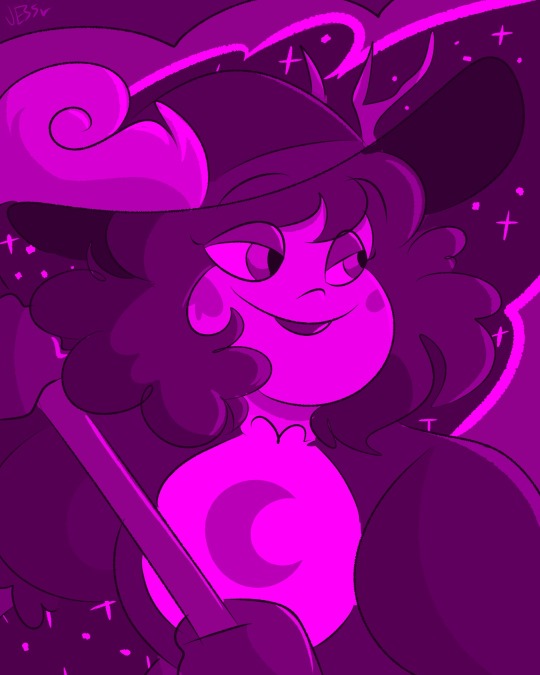
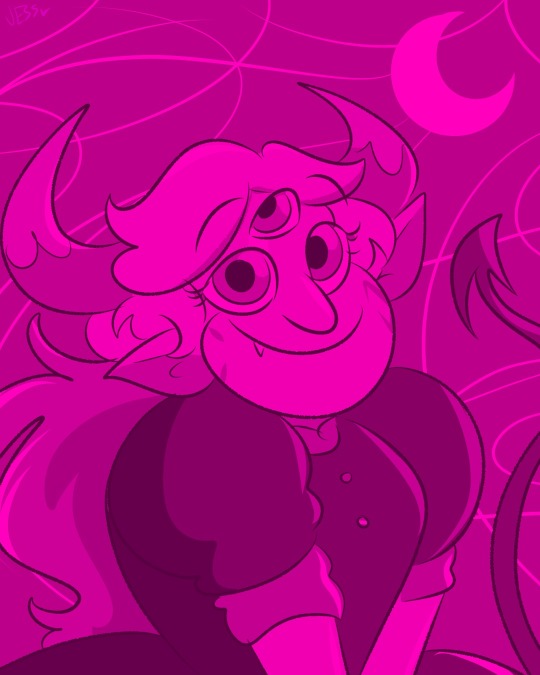
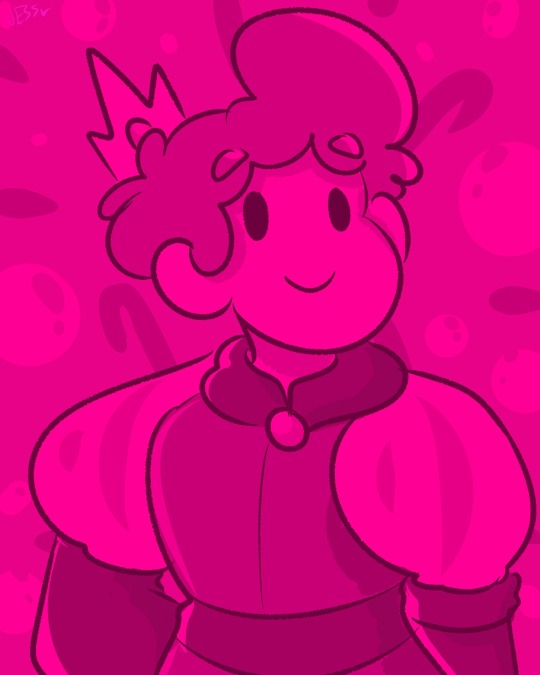
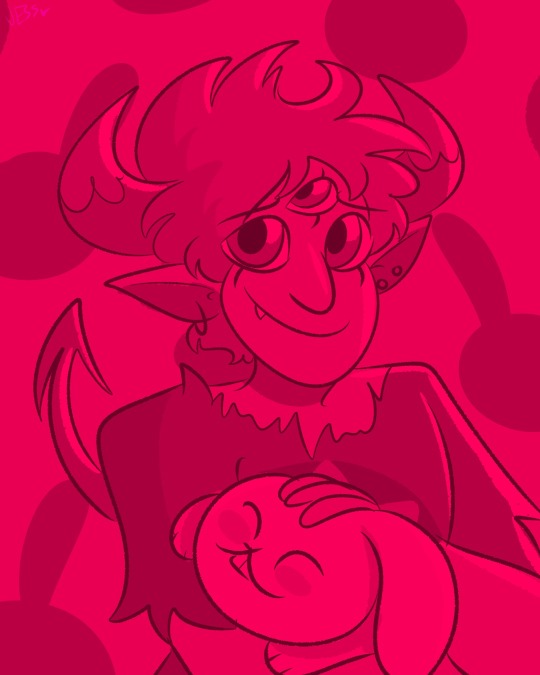
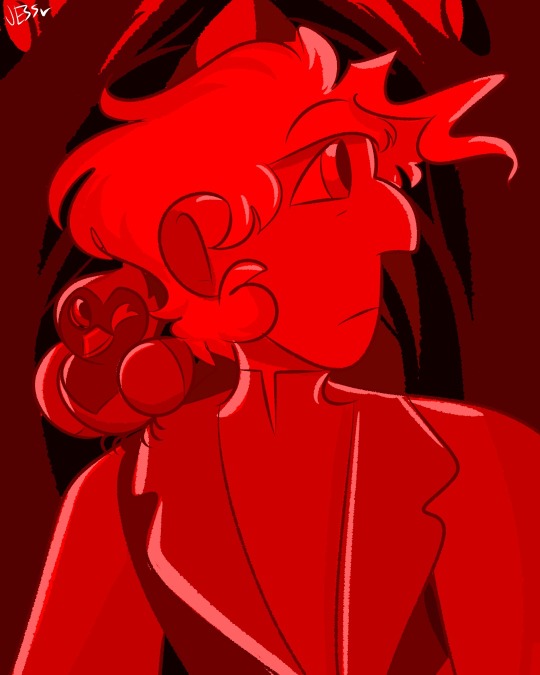

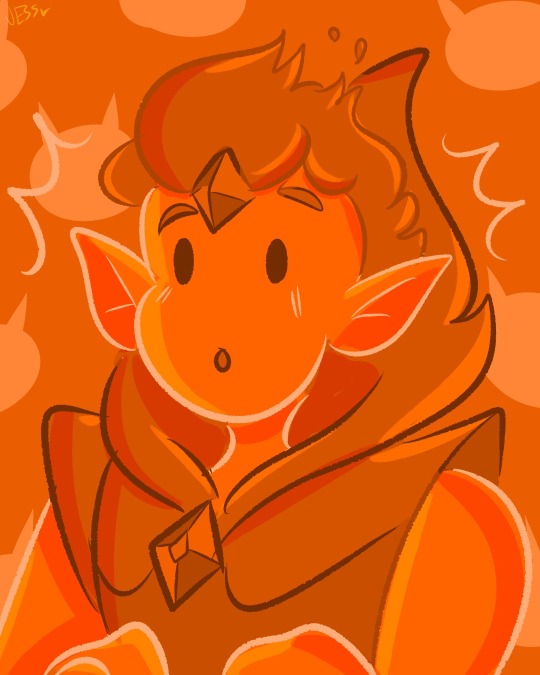
Finishing up huevember
#my art#star vs the forces of evil#svstfoe#svtfoe#a reverse of feathers and mud au#sky and the forces of the multiverse#areverseoffeathersandmudau#the owl house#toh#a reverse of feathers and mud#lilith clawthorne#flame prince#adventuretime#adventure time#caleb wittebane#flapjack#eclipsa butterfly#prince gumball#gary prince#original characters#original character#demon#tomstar bby#janstar bby#luz noceda
185 notes
·
View notes
Text
thinking about how adam was the first human soul in Heaven bc what the fuck happened to Abel. did he go to hell (for some reason?)
like what happened there. he was the first human to ever die so like would the theories saying Eve is the first person to enter hell be therefore incorrect? Because Adam and Eve had another son to replace Abel, Seth. Eve did not die first.
idk i have gripes and confusion about that stuff.
#hazbin hotel#hazbin hotel theories#hazbin hotel spoilers#adam hazbin hotel#like what is happening#because the only thing I can think of is able went to hell and he would have had to go to hell before his mother#or he just went nowhere??#like. idk the story of cain and abel is interesting and like basic bible canon stuff.#i could maybe see abel was actually shitty in the show and lucifer convinced cain to kill him maybe bc of that since lucifer is not evil#but this show doesnt seem to think very deeply.#it feels more like abel and cain were probably forgotten#but like man i dont know whats going on#hazbin hotel critical#although i guess in the show the first human to enter hell was Lilith regardless#Eve can still be relevant since she *ate* the forbidden fruit first though
125 notes
·
View notes
Text
A HH Lucifer-centric AU 17/?
PART 1, PART 2, PART 3, PART 4, PART 5, PART 6, PART 7, PART 8, PART 9, PART 10, PART 11, PART 12, PART 13, PART 14, PART 15, PART 16, PART 18, PART 19, PART 20, PART 21, PART 22
Back in business, y'all!
It finally arrived on this part. I'm excited what you all think of this development.
The italics at the end are flashbacks Lucifer is having on that particularly familiar convo.
-----------------------------------------
Lucifer didn't know what he expected to see beyond the entrance to the tree. He had assumed it would be like the outside- plastered with evil and decay and suffocation. Hell, he expected that he would die the second he steps inside because he may be the King of Hell but this is a being as old, possibly older, than his Father.
He didn't expect this though.
Cotton clouds walking along the vibrant blue skies like a herd of sheep. Towering trees, adorned with leaves as shining like the finest emerald, dance gracefully in the soft breeze. There's crystal-clear waters acting like a mirror for the heavens, tranquil movements reflecting the azure sky above. Animals, predator and prey are frolicking without a care in the world as if the circle of life simply does not exist.
And at the heart of it all, in the place where time stands still, lies an apple tree. The clouds make way for the sun above to shine its golden rays, helping Lucifer's brain solidify where he is.
There is no way.
Lucifer: Eden?
The Sin of Pride hears humming behind the tree. He moves closer to inspect and gets his second shock of the day. He chokes up a little.
Lucifer: Lily?
It was Lilith? That can't be right. The woman smiles at him but it doesn't look like Lilith. Her smile was always warm, serene, and full of life- this was not his ex-wife and wow, did that thought just made him start to lose it.
Lucifer: W̶͇͚̫̻͂̄́̽̽͗ẖ̷̮̩̄͂͛̊̓̕͠à̵̯̪͇̝t̵̘͔̪̱̤̗̙̂ ̸̨̡̻̰̼͖̈́̀͐̒̏̕t̶̡̛̼̺̱̳̮̍͌͐͠ͅh̸̫̔͒͠͝ę̶̱̩̪̝̪̏͌͆̾̕ ̶̟̥̒́̎h̵̑̉͜ë̵̹̓l̵͉̘̗̆͑̏͝͝l̸̘̹͔̣̓́̂̚ ̸͉͖͑́̑̋ả̷̹̩̰r̸̩̖̼̔͊̽̈́̈͐̕ͅë̵̡͓ ̵̠͚̝̜̾̒̃́y̸̭͒̽̋̈́̋ȯ̸̘̈́̍̃ͅu̴̪̫͉̯͍̬̠̐̆́ ̷̞͈͒̄̔̑͐͋͝d̴̢̦͚̐̊̓̍͌õ̵̝͍͉͉͔̲͑̇̎͌͋̀į̸̥̮͔̊̾̚ṇ̴̣̬̀̈́̈́̓̎̕̚͜ǵ̵̼̖̄ ̸̹̬͍̓̑́͆̎w̶̛̲̮͓̤̩̗͕̒̌̄̆̈͝ė̴̖̏̀͆̊͑͝ạ̶̺͍̥͌̽̀̒r̸̨̞̣̖̺̱̐̃̔ͅį̸͙͔̈́͐̆ņ̵̺̟̠̏͑̒̚ḡ̵̜͛̆̒͌ ̴̧̞̮̰̦̲̇̄̽̋͆̄ͅt̵̘̓͆͗h̷̳̗̖͘ã̴̘͉̹̘̯͚͠t̵̳̂͝ ̴̨̦̭̳̒͂́͌̓͋͝f̷̢͚̀͐à̷̢̩c̷̤̝̼̞͙̮̄̾́̽̅̀͐͜ẻ̸̛͈͝?̴̮̗͎͓̥̱͑̒̈́̈́̿ͅ!̴̩͍̭͕̳̳̭̉̆
Roo: Well, I can't let you see my true form now, could I? It would likely burn your eyes where you stand. Soooo, I picked something you're... a little bit more familiar with. You like it?~
Lucifer: Y̸̦̥̥̱̞̓̌͐͜͠o̶̥͍̊̈́̋͠ü̶̢̠̩̙͎̈́ ̶̛̮͙̜͔̋͋̽̇̈́ḣ̸̫̈̓̔͂͠a̵̰̤̳̅͒̉̆̕v̵̡̖̰̺̂̂͒̎̀͑͠ḙ̸̟̥́̃̈́̄͝ ̸͎͙̳͎̖̀̍̎͜n̵̢̩̪͉͔̗͈̈́͘o̷̗̻͕̯͋̄̃͝ͅͅ ̷̞̹̥̻̤̥̋r̶̨̫̳͔̀͌̓͊͊͜i̵̧̲̪͍̻̹͍͆̍̈́g̷͚̑h̴̨͎̰̀̀́͗̿͜͝ṱ̵̠̍́͆̃̎̏!̶̢̧͉̻̺̣̬̊
Roo: And who are you to tell me what to do, fallen? You're a mere speck in my sight. Besides, didn't my sister use that other woman's face? What was her name? Eve?
Lucifer: F̶̤͍̪̭̾̑̈͊͠ù̴͈̫̚c̵͇̎́̍̽̚͠k̵̳̩̞̖̝̤̀̒͋͌̉í̶̧͚̟̠̚̚ň̸̨̘̖̳̳̆̐͗̋-̴̮́̾͒̔͆
Lucifer lunges but the fact that it is his ex-wife's face made him hesitate enough for Roo summon roots, essentially pinning him against the Tree of Knowledge.
Roo: Can't have that, dear fallen. Hmm, how can I make you behave? Perhaps this look is a bit outdated. How abouuttt...
Lilith's face was enveloped in red and black, smile morphing into an all too familiar grin. One moment he was staring at Lilith's beautiful face, now he found himself locked in a gaze with the unmistakable form of Alastor.
Roo: This is more your style now right, sire? I must say, this one looks more outdated and tacky.
Anger must still be all over his face because Roo made a pondering look. The Root of All Evil pretended to contemplate before obnoxiously letting out an excited squeal.
Roo: Oh! I got it!
Alastor shrinks, his red bob cut lengthens, turning blond from the roots. Gray skin became porcelain white with red circles appearing on the cheeks.
He's going to kill her.
Roo: Perfect, no?
He's going to kill this fucking bitch for using his daughter's face!-
He breaks free from his restraints in a flurry of rage, hand immediately grasping Roo's (NOT HIS DAUGHTER) neck. Charlie (NO IT IS NOT HER) struggles, sending the roots back to get him but his hellfire is preventing them to get closer.
Lucifer pries Roo's mouth open and began reciting an incantation- runes physically manifest themselves, entering Roo. Lucifer can feel the power of Goodie's seal flow out of him, draining him of his strength. He start coughing up blood but pushes through.
This is for Charlie. For everyone.
By the end of it, Roo is motionless and Lucifer slumps on the tree, exhausted beyond belief. He's holding his throat as golden blood drip from is mouth. Goodie didn't say it was this bad.
He tries not to look at Roo's body. She's still wearing Charlie's whole being and he doesn't want to see an almost dead version of his daughter's face.
Lucifer thought it was over until there was a chuckle. He looks on in horror as the mangled body of Roo sat up in manic laughter. His daughter's lovely smile turned more broken, so much that it's tearing her face apart.
Roo: Surprise!!!
Lucifer: What...? You're supposed to be sealed now. I was inches away. It was supposed to work!
Roo bursts into more laughter like he just said the dumbest thing ever. She looks up to the sky.
Roo: Oh man, you're really that stupid?? This ritual was never going to work and Goodie knew it! All this ancient thing does is barely prick my finger.
Lucifer: I don't understand. I- why?
Roo: Because Goodie knew what I needed and sent you to give it.
Lucifer thinks back to his first conversation with Goodie and feels this sense of dread.
Goodie: I can lend you something that shall be enough to contain her. But for this to work, I need one thing.
Lucifer: And what do you need?
Lucifer: What is it?
Beautiful Eden disappeared and now replaced with a decaying forest. The green grass turned into the red flowers from outside as they continue to excrete miasma.
Lucifer never felt so breathless.
Roo and Goodie: You
#hazbin lucifer#hazbin hotel#hazbin alastor#hazbin hotel lucifer#hazbin charlie#hazbin angel dust#hazbin husk#hazbin lilith#hazbin vaggie#hazbin nifty#hazbin cherri bomb#hazbin sir pentious#hazbin hotel charlie#hazbin hotel alastor#hazbin hotel vaggie#hazbin hotel niffty#hazbin hotel sir pentious#hazbin hotel cherri bomb#radioapple#alastor x lucifer#lucifer x alastor#duckiedeer#appleradio#alastor and lucifer#lucifer morningstar#lucifer magne#lucifer centric#roo hazbin hotel#root of all evil#hazbin hotel roo
96 notes
·
View notes